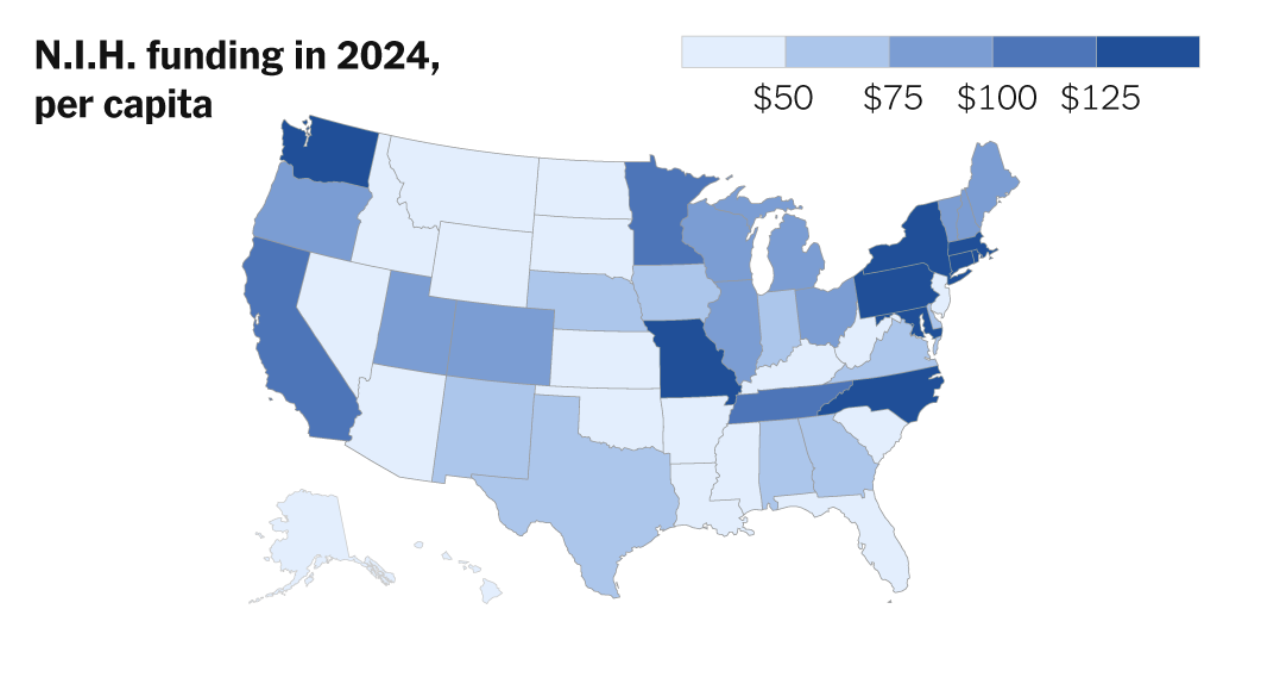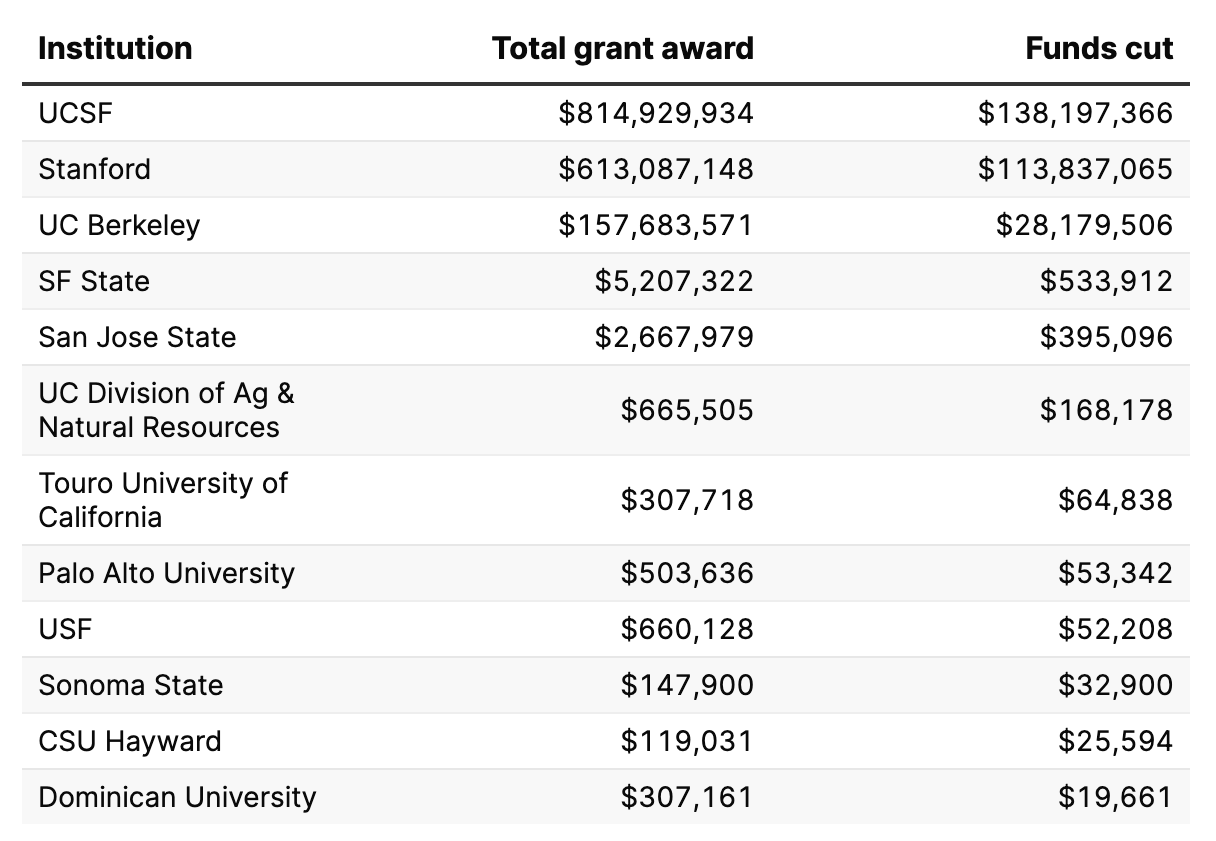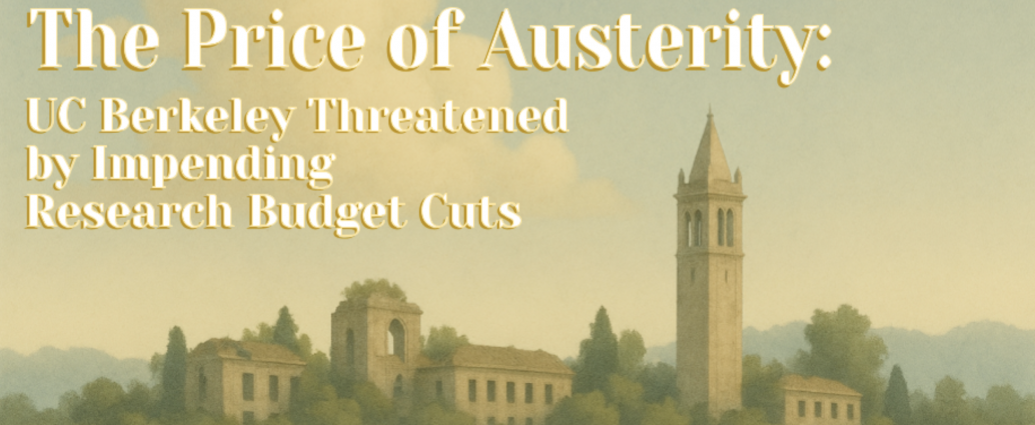Author: Sydney Roker, Graphics: Business Review at Berkeley
Proposed NIH budget cuts by the Trump Administration could have devastating effects on not only UC Berkeley’s campus, but on the greater Bay Area economy and the local Berkeley community.
Federal Budget Cuts Threaten Academic Research Nationwide
In the days following President Donald Trump’s inauguration, the new administration proposed substantial cuts to the budget of the National Institute of Health (NIH). According to administrators, scientists, and researchers from universities across the country, the decrease in federal financial support would have devastating impacts on academic research and would slow scientific progress, putting the pioneering work of university researchers, including those at UC Berkeley, at risk. Other consequences of the potential reductions in funding are less obvious but are equally concerning, as they would likely have a significant impact on both the regional and national economies.

Broader Economic & Community Implications
Budget Cuts Impact UC Berkeley Campus
Proposed plans for the NIH budget reduce “indirect cost payments” to universities from an average of 50% to 15%, which Sarah Speizer, Vice-President and Chief of Staff of Government Relations at the American Council, said would leave universities “scrambling.” UC President Michael Drake called the proposed budget cuts “not only an attack on science, but on America’s health writ large” in a statement issued in early February. In the months since, the UC system has continued to face challenges related to federal funding changes, the most recent following the federal government shutdown effective on October 1. In a statement issued the same day, UC External Relations & Communications Vice President Meredith Turner released a statement regarding expectations on campus impacts. While immediate impacts on research are not expected, “UC campuses won’t be able to draw down federal funds, and agencies are unlikely to issue new contracts, renewals, or awards until the shutdown is resolved.” This only exacerbates the effects of the current near seven month University of California hiring freeze issued on March 19, which Drake said was a way to prepare for the “significant financial challenges ahead” in a statement issued that day.
Hiring freezes have since affected the everyday operations of UC Berkeley’s campus. Union protests in early March, seeking higher pay and improved working conditions, provided a preview of the bumpy road ahead that could result from a reduced number of staff, as the operations of many research labs and student programs were negatively impacted while workers who stocked supplies and contributed to the daily operations of UC Berkeley Labs were unavailable.
Funding realignments could affect even programs that are not directly supported by NIH funding, as noted by Nadia Akbar, a graduate journalism student:
“The journalism school gets money from funding to support students (via tuition) and student projects. Some of this comes from private donors and organizations. But if the University at large is suffering from budget cuts and a lack of funding, then perhaps it will affect where the private funding will go,” Akbar said.

Economic Effects Extend Locally
The consequences of the cuts to research funding would extend far beyond the realm of academic research. These cuts would create a ripple effect that would not only reach the local economies that are bolstered by the universities in their midst, but the national economy as well. An amicus brief, signed by 45 cities, including the city of San Francisco, highlighted the damage to local economies that NIH budget cuts would have:
“[T]he impact of cuts could include immediate hiring freezes, layoffs, and loss of jobs, fewer clinical trials, and a severe economic hit to many of our most critical anchor institutions, imperiling their positions as key economic drivers in our communities,” the brief stated.
The impact that UC Berkeley has on the Bay Area economy is a prime example of the economic power that universities have. UC Berkeley labs generate over 5,600 jobs and $446.5 million in annual personal income. A significant drop in the productivity of UC Berkeley labs, as would result from the cuts, will therefore almost certainly lead to job loss and to an overall reduction in income for Berkeley and Bay Area residents, which would then adversely impact local businesses as well, deepening economic distress. In short, the proposed funding reductions would not only slow or halt potentially lifesaving research, but would likely also significantly slow economic growth on both a regional and national level.
Take-Home Points
- Proposed NIH budget cuts under the Trump administration could severely impact academic research by reducing funding for universities, including UC Berkeley.
- UC Berkeley students and employees have protested the proposed cuts, fearing job losses and setbacks in both STEM and humanities research.
- The university has implemented a hiring freeze in response to financial uncertainty, disrupting daily operations and ongoing research projects.
- The cuts could harm local economies, leading to job losses as well as reduced economic activity in communities surrounding research universities like UC Berkeley.

